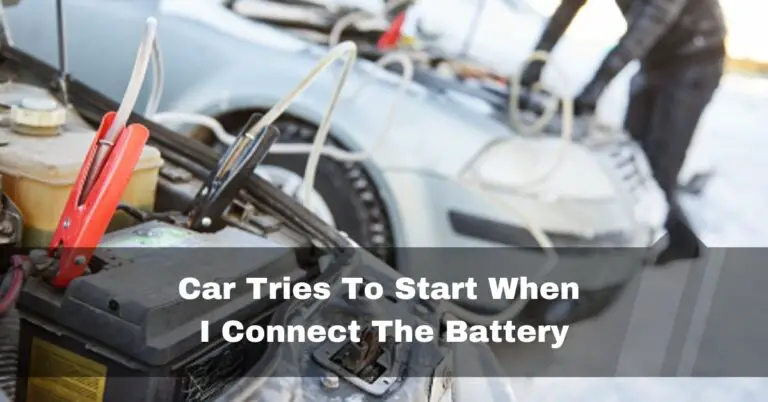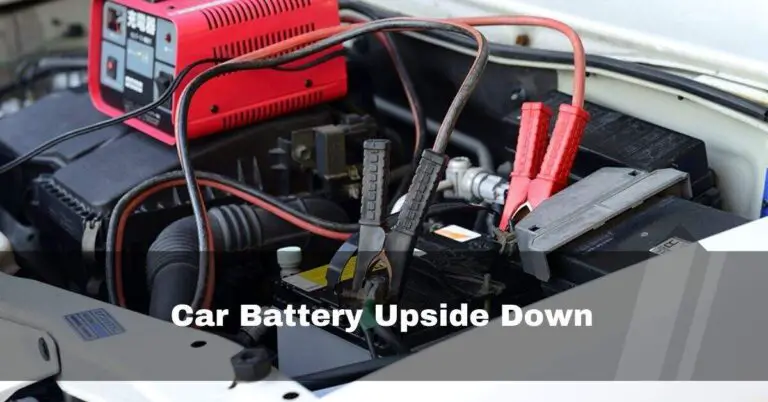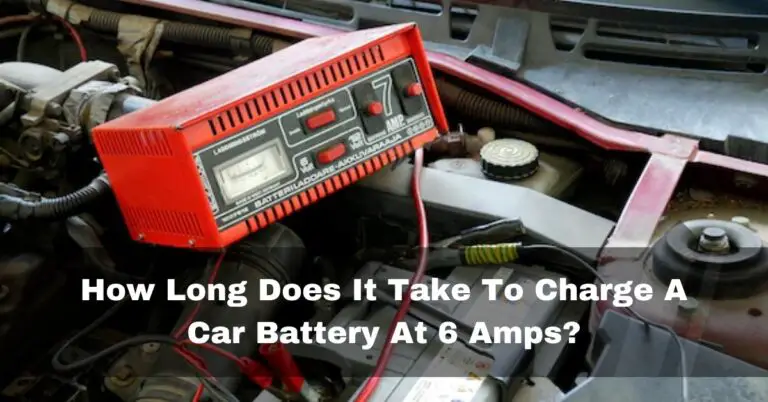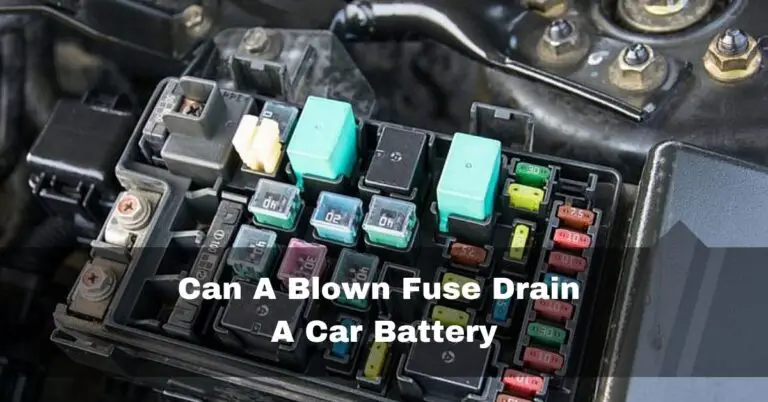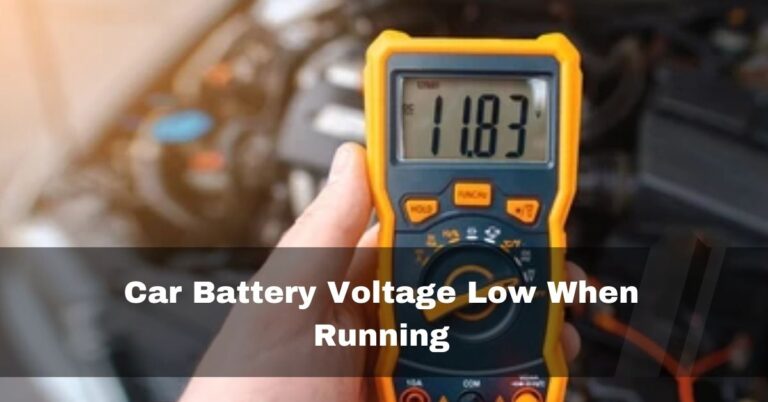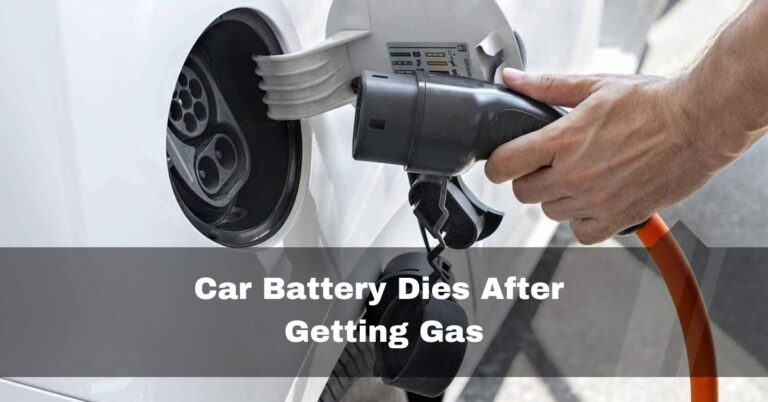Car Battery Bubbling When Charging – How To Fix It In 2024
I faced the issue of my car battery making a bubbling noise when charging, and it immediately raised concerns about the potential impact on the battery’s lifespan, safety hazards, and the looming possibility of expensive repairs or replacements.
Why is my car battery bubbling? (Short Answer)
If the Battery bubbles, that usually means you produce Hydrogen and Oxygen (some call it HHO). That’s explosive. That usually means you lose water from the battery. If it is a vented lead-acid battery, then the bubbling noise you hear is an electrochemical reaction that occurs while charging a battery.
In tackling this problem, I delved into researching and implementing effective solutions to ensure not only the longevity and reliability of my car battery but also to promote safe and efficient charging practices for all drivers.
Table of Contents
What Causes A Battery To Bubble While Charging?
Encountered this issue myself and, in the process of resolving it, delved into understanding the causes behind a car battery making noise while charging. Here’s what I discovered.
1. Overcharging:
Should a battery bubble when charging? Yes, Overcharging is the most common reason for the battery bubbling during charging or battery sounds like it’s boiling.
Why is my battery bubbling when charging?
- When a battery receives more charge than it can handle, it leads to overcharging.
- The excess electrical energy causes the electrolysis of water in the battery, producing hydrogen and oxygen gases.
- This gas generation results in bubbling and, if unchecked, can lead to water loss and potential safety hazards.
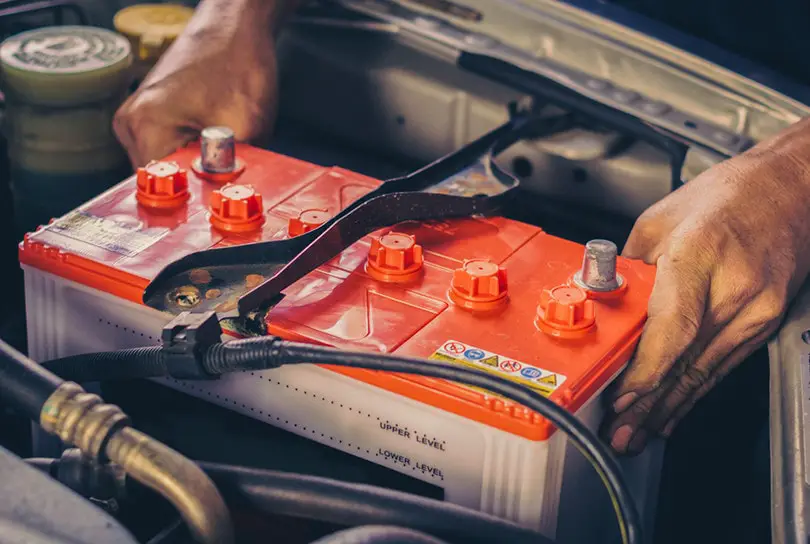
Also Read: Car Battery Making Hissing Noise
2. High Charging Voltage:
Another reason for battery bubbling is a high charging voltage. Too much charging voltage might overheat the battery and result in bubble formation. The high charging voltage can also cause the battery to lose electrolytes, damaging the battery.
3. Sulfation:
Battery fizzing when charging? Sulfation is a process where the lead sulfate crystals in the battery cells become complex and difficult to charge, preventing the battery from accepting a charge. When the battery is charged, the sulfation process can cause pressure inside the battery, creating bubbles.

Also Read: How To Fix Reverse Polarity On A Car Battery
4. Internal Short Circuit:
An internal short circuit occurs when the positive and negative plates inside the battery touch, causing a flow of current that generates heat. The electrolyte solution can boil due to the heat, resulting in bubbles.
Can I Boil Batteries To Recharge them? Don’t do this first, please. They may leak or explode, but neither action will increase their reserve power. It can be sufficient to just warm them up in your hands because they are safe to warm up to a temperature that you can accept touching.
5. Faulty Charging System:
Battery bubbling on the trickle charger? Bubbles in a battery can also be produced by a lousy charging method. If the voltage regulator in the charging system is not working correctly, it can cause the car battery to bubble sound when charging.

Ways To Prevent Battery Bubbling During Charging:
Having personally encountered the issue of battery bubbling during charging, I understand the importance of implementing measures to prevent this phenomenon. Here are personalized tips based on my own experience:
1. Avoid Overcharging:
Car battery making bubbling noise when charging? Overcharging is one of the leading causes of battery bubbling. Use a charger that is compatible with the battery and has a decent charging rate to avoid overcharging. Unplugging the charger when the battery is fully charged is also crucial.
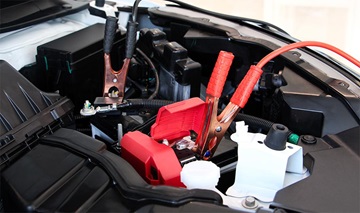
Also Read: Vaseline On Car Battery Terminals
2. Use A battery Charger With Automatic Shut-Off:
A battery charger with an automated shut-off mechanism can stop overcharging and stop battery acid or water from bubbling while it is being charged. When the battery is ultimately charged, the charger automatically turns off to protect the battery from harm.
3. Check The Charging Voltage:
It’s crucial to check the battery’s charging voltage constantly. High charging voltages can harm batteries by causing battery bubbling. If the voltage is too high, reduce the charging pace or change the charging setup.
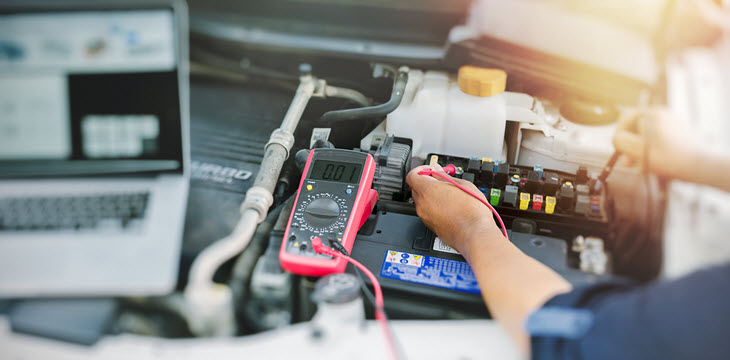
Also Read: How Long Does It Take To Change A Car Battery
4. Avoid Sulfation:
Sulfation can be prevented by using a battery maintainer or charger that can de-sulfate the cells. A desulfation charger can break down the complex lead sulfate salts and restore the battery’s capacity.
5. Select A Proper Charger:
Choose an appropriate charger for your battery’s capacity to reduce the risk of battery bubbling. A commonly recommended guideline is to select a charger with an amp rating of around 10% of the total amp-hours of the battery.
To reduce the chance of overcharging and bubbling, seek a charger with a lower amp rating if you want to use it indoors.
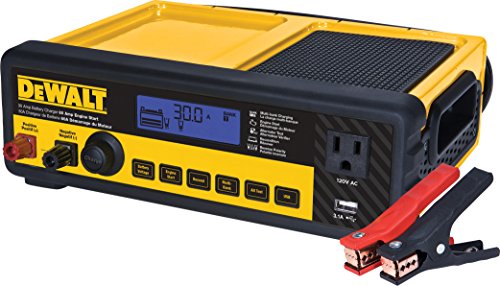
A charger with a higher amp rating delivers more current to the battery, which can increase the risk of overcharging and bubbling.
It is because overcharging causes the electrolyte in the battery to break down, which produces gas bubbles. Over time, these bubbles can damage the battery’s plates and reduce its overall lifespan.
Also Read: Why Is My Car Battery Showing 15 Volts
Car battery making bubbling noise when turned off?
While the chances of a car battery exploding are remote, the presence of a bubbling noise might signal an overcharging issue.
This potential overcharging is often attributed to a malfunctioning alternator or voltage regulator. These components play a vital role in maintaining the proper charging dynamics of the battery.
Lead acid battery bubbling while charging?
Is Lead acid battery making noise when charging? Lead acid batteries make noise when they are being charged. The reason is that lead-acid batteries normally form bubbles on the plates during charging.
During charging, the electrochemical reactions within the battery cause the decomposition of water (H2O) into hydrogen (H2) and oxygen (O2) gases.
These gases form bubbles on the battery plates. This process, known as electrolysis, is fundamental to the charging mechanism of lead-acid batteries and is crucial for their overall functionality.
Also Read: How Long Does It Take To Charge A Car Battery At 6 Amps
12v battery making noise while charging:
It is not normal to hear electrolytes flowing or bubbling when charging an AGM (Absorbent Glass Mat) sealed lead-acid (SLA) 12V battery.
The noise of electrolytes flowing or bubbling during the charging of a 12V AGM-sealed lead-acid battery is abnormal. AGM batteries, known for their maintenance-free design, should not produce such sounds.
The occurrence of bubbling may signal a potential problem, such as overcharging or internal damage. Adhering to the manufacturer’s charging guidelines is crucial to prevent harm to the battery.
car battery fizzing when charging:
The occurrence of fizzing or bubbling in a car battery while charging is not typical and may indicate underlying issues. Overcharging is a potential cause, leading to the boiling of electrolytes and the production of bubbles.
Additionally, a buildup of hydrogen gas within the battery can result in bubbling when it escapes. Both scenarios highlight the importance of addressing charging irregularities promptly to prevent damage to the battery and ensure safe operation.
Also Read: Car Dies When Removing Positive Battery Cable
How to Select a Proper Charger to Reduce Battery Bubbling?
Selecting a 3-stage smart charger for flooded lead-acid batteries is likely to result in bubbling during charging. For indoor use of battery backup banks, it’s recommended to choose a charger with an amp rating below 10% of the total amp hours to reduce the risk of overcharging and excessive bubbling.
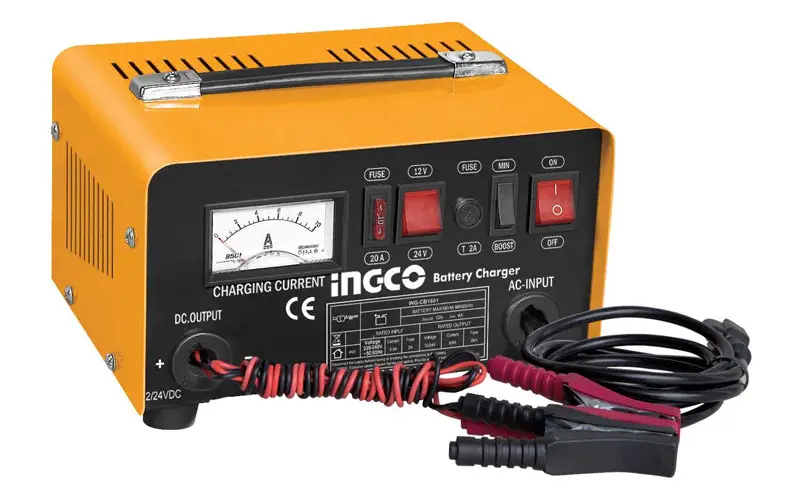
A high-quality float charger is essential, maintaining precise electricity delivery as the battery drains. Voltage levels around 13.2-13.3 volts during the float stage are optimal, with any voltage above 13.8 volts potentially triggering overcharging.
Also Read: How Far Can A Car Drive On Battery Only
When Is a Bubbling Battery Dangerous?
The battery is warm or hot? Determining the safety of a bubbling battery involves monitoring its temperature during charging. Although the bubbling might suggest boiling, it’s actually the result of electrolysis releasing hydrogen and oxygen.
Typically, internal temperatures don’t reach a boiling point. To ensure safety during charging or controlled overcharge, check if the battery becomes warm by touch.
Extended processes like desulfation may increase temperature, so conduct them outdoors or in well-ventilated areas to avoid issues with fumes, ensuring a secure charging environment.

It’s crucial to cease charging right away if you encounter any of these problems. First, make sure you’re wearing eye protection at all times. Remove your charger from the wall next. Finally, you can take the clamps off the battery when the charger has been removed from the outlet for 15 seconds.
Related Questions:
1. Is Battery Bubbling Dangerous?
Yes, battery bubbling can be dangerous. A battery can short out, and the plates can twist from the heat at that point. The battery may blow up or catch fire if the gas created by the bubbling is not properly let out.
2. What Should I Do If I Notice My Battery Bubbling During Charging?
If you notice your battery bubbling during charging, stop charging the battery immediately and check the charging system for any issues. Continuing to charge the battery could cause damage to the battery and potentially create a safety issue.
3. Can Battery Bubbling Damage My Car?
Yes, battery bubbling can damage your car, especially if the gas produced is not released correctly. It can lead to corrosion and other damage to the surrounding parts.
4. Can Battery Bubbling Be Fixed?
In some cases, battery bubbling can be fixed by draining the electrolyte and refilling it with distilled water. This is only occasionally feasible; in certain circumstances, a new battery may be required.
5. Is It Okay For Gel & AGM Batteries To Bubble?
Is the AGM battery bubbling while charging? It is not okay for gel and AGM(absorbed glass mat) batteries to bubble during charging. Bubbling can cause damage to the battery and reduce its lifespan. It is essential to use a charger designed for gel and AGM batteries and monitor the charging process to prevent overcharging.
6. Why is my deep cycle battery bubbling while charging?
When charging amperage exceeds the level of the natural absorption rate, the battery may overheat, causing the electrolyte solution to bubble, creating flammable hydrogen gas. Hydrogen gas, when combined with oxygen from the air, is highly explosive and can easily be ignited by a spark.
7. Why Is My Lead Acid Battery Making Noise When Charging?
One of the batteries is making a noise as hydrogen gas escapes. When a lead-acid battery is charged, hydrogen gas is created. It’s possible that the battery is being charged too quickly if it’s a sealed variety.
8. Why Is My Battery Leaking Water While Charging?
One of the more frequent causes of battery leaking is battery overcharging. When this occurs, the electrolyte in the battery begins to boil, resulting in the release of acidic vapor through the vent caps. The battery appears to be perspiring as the steam collects on its outside.
9. Why does battery overflow acid when charging?
Overcharging a battery increases the electrolyte solution density during charging. If too much water is added beforehand, the elevated density causes the battery to overflow, potentially leading to damage. Managing water levels according to guidelines before charging is crucial to prevent such issues.
10. My batteries are boiling or smelling during charge?
If the electrolyte is boiling, it indicates excessive heat, likely from charging at a current and voltage that are too high. On the other hand, if you observe a few bubbles in the electrolyte, they are likely hydrogen or oxygen gas released during the charging process when water undergoes electrolysis.
Conclusion:
Drawing from personal experiences and extensive research, it’s evident that battery bubbling during charging is a common issue faced by many car owners. The root causes often include overcharging, elevated charging voltage, sulfation, internal short circuits, and issues with the charging system. As I navigated through resolving this problem, I discovered practical preventive measures that can be instrumental in maintaining a healthy battery and preventing bubbling.
Also Read:
- Car Only Starts When Jumped Battery Good
- Can A Bad Battery Make Your Car Overheat
- Car Starts After Disconnecting And Reconnecting Battery
- Lightweight Car Battery Daily Driver
References:
- https://community.victronenergy.com/questions/59070/batteries-make-bubbeling-noise.html
- https://www.reddit.com/r/MechanicAdvice/comments/8yhb4g/car_battery_makes_a_bubblingfoaming_sound_while/
- https://electronics.stackexchange.com/questions/306377/lead-acid-battery-boiling-during-charging-this-is-bad-right
- https://www.quora.com/Why-is-my-car-battery-bubbling-Is-this-normal
- https://www.ex-500.com/threads/gurgling-from-battery-while-trickle-charging.21740/

